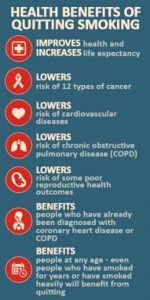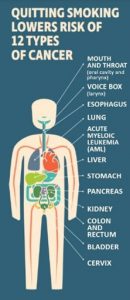Community Action for Tobacco Prevention
Community engagement is a vital part of successful tobacco prevention. Community attitudes, norms, and policies help shape the tobacco environment in our county, which affects everyone, especially impressionable youth and others that may be vulnerable to tobacco use or secondhand smoke and vapor. Engaging in tobacco prevention can help reduce the number of people that start smoking, vaping, or using other tobacco products, and it can help encourage those that currently use those products to quit.
Check out the list of ways that you can get involved with preventing tobacco use in your community below!
Want to help us make this page better? Click the button below to take a survey about what you learned and how we can improve!
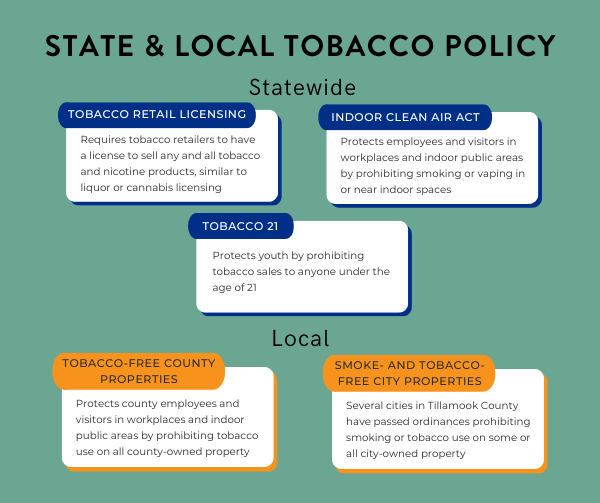
Ways to get involved
Vote
If you are eligible to vote in Oregon, registering to vote and participating in all elections, even at the local level, is one of the most effective ways to ensure your voice is heard.
If you are not yet registered to vote, you can do so online. U.S. citizens 16 years of age or older are able to register to vote. Once you have registered, you will start receiving ballots when you are eligible to vote, starting at age 18
Register to vote here: https://sos.oregon.gov/voting/Pages/registration.aspx?lang=en
If you aren’t sure if you are registered to vote, or if you need to update the information on your voter registration, you can do so using the Oregon Secretary of State’s My Vote tool.
https://sos.oregon.gov/voting/pages/myvote.aspx?lang=en
It is important to update your voter registration status if any of the following information has changed:
- Your mailing address
- Your residence address (even if you use a P.O. Box)
- Your name
- Your party affiliation
If you are looking for information about an upcoming election, or if you have questions about voting in Oregon, you can visit the Tillamook County Elections Division page:
https://www.co.tillamook.or.us/clerk/page/elections-division
Educate yourself and others on tobacco risks and prevention
Learning about the negative impacts of smoking, vaping, or using other tobacco products can help you protect yourself and others from those risks. If you are a current or former tobacco user, it may motivate you to quit or stay quit, and for non-tobacco users, it can help prepare you for difficult conversations with loved ones about tobacco use. It also helps to be familiar with the wide range of free resources available to help someone quit tobacco – you don’t have to do it alone!
As a current or former tobacco user, you are probably very familiar with the health risks of tobacco, and may have even experienced some of them yourself. Reminding yourself of those risks can help motivate you to quit, if you haven’t already, and can help you stay quit if you find yourself struggling.
Quitting tobacco also helps those around you live healthier, tobacco-free lives. Youth in tobacco-free households are less likely to start using tobacco themselves, and smoke- and vapor-free homes protect them from the harmful effects of secondhand smoke.
Ready to quit or need support? There are a variety of free resources available to meet you where you’re at in your quitting journey!
- Oregon Tobacco Quit Line: Talk to a trained Quit Coach, develop a quit plan, and receive free support, including up to 2 weeks of free nicotine patches or gum (if eligible). Contact the Quit Line today at 1-800-QUIT-NOW (1-800-784-8669) or online at www.quitnow.net/oregon.
- Línea quitline en Español: Ayuda las 24 horas del día, los siete días de la semana. Más información aquí. 1-855-DÉJELO-YA (1-855-335-3569)
- Become an EX: Free online support community and resources for current and former tobacco users.
- This is Quitting: For teens and young adults who want to quit e-cigarettes. Text DITCHVAPE to 88709
- Smart Phone Apps
- QuitGuide: A free app that helps you understand your tobacco use patterns and build the skills needed to become and stay tobacco free.
- QuitSTART: A free smartphone app that helps you quit tobacco with tailored tips, inspiration, and challenges.
- Talk to your healthcare provider: Working with a health care provider such as your doctor, dentist, or pharmacist can increase your chances of quitting tobacco for good. They can help you personalize a quit plan that works best for you. They can refer to counseling and prescribe nicotine replacement therapy (NRT) and/or other medications. It is proven that using a combination of cessation methods leads to the best chance of success. Most health insurance plans, including the Oregon Health Plan and Medicare Part B, are now required to cover some level of tobacco cessation treatments. Check your health plan to see which cessation treatments are covered. For more tips on how to start the conversation with your provider, visit: https://smokefreeoregon.com/oregonians/helping-people-quit-tobacco/im-ready-to-quit/.
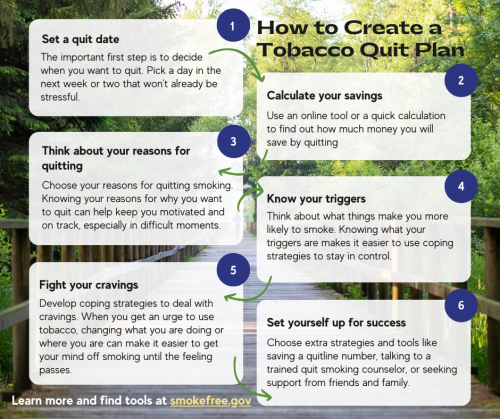
If you are an adult who interacts frequently with adolescents, it’s important to know how to talk to the youth in your life about the risk of vaping, smoking, or other tobacco use. There are many resources available to help you get started with having those difficult conversations. Check out some of them below!
FDA Vaping Prevention and Education Resource Center: Free, science-based resources from the FDA for talking to students about vaping risks and prevention. Includes information for teachers, parents, and students.
Talk with Your Teen About E-cigarettes: A Tip Sheet for Parents: A guide for parents on how to prepare for, start, and maintain the conversation about the dangers of e-cigarettes with your teen or adolescent. It also has answers to common questions your teen (or you) might have about e-cigarettes.
Hable con sus hijos adolescentes sobre los cigarrillos electrónicos (e-cigarrillos): Hoja con consejos para los padres: Una guía para los padres sobre cómo preparar, iniciar y mantener la conversación sobre los peligros de los cigarrillos electrónicos con su adolescente. También contiene respuestas a las preguntas más comunes que su hijo (o usted) puede tener sobre los cigarrillos electrónicos.
This is Quitting for parents: A free, texting-based resource for parents and/or caregivers of young people who vape. Text QUIT to 847-278-9715 to get started.
Become an EX: Helping a Teen or Young Adult Quit Vaping. Resources and an online support community for parents and caregivers trying to help a young person quit vaping. Sign up online, or text QUIT to 202-899-7550 to receive supportive reminders and tips via text.
SmokefreeWomen: Resources for quitting tobacco while pregnant or parenting.
You probably hear a lot of information about how dangerous smoking, tobacco use, and vaping can be. But other messages might tell you that these things, especially vaping, are safe. It can be hard to tell what’s real and what’s just good advertising.
Aside from the known cancer risks of both cigarettes and smokeless tobacco, the nicotine in all products (including “tobacco-free” e-cigarettes/vapes) can have negative effects on brain development and mood, leading to problems with focus, memory, learning, and increasing feelings of depression and anxiety.
To learn more about the actual risks of tobacco (including vaping), visit https://teen.smokefree.gov/the-risks-of-tobacco/know-the-risks.

If you or someone else you know uses or is thinking about using e-cigarette/vape devices, cigarettes, or other tobacco, there is help available.
This is Quitting: A free resource to help teens and young adults quit vaping. Visit their website or text DITCHVAPE to 88709 to get started.
Smokefree Teen: Free tools to help you quit smoking, vaping, or using tobacco. Text QUIT to 47848 or visit https://teen.smokefree.gov/become-smokefree/tools-for-quitting
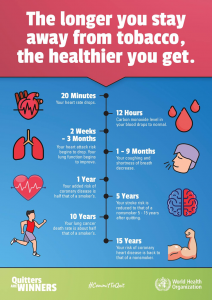
As a healthcare or social service provider, you may come into contact with clients who want to quit tobacco, or those who want to learn more about the risks of using tobacco. It’s important to have free and accessible resources available to those people, so you can help empower them to take charge of their health. See below for some useful resources to share with your patients or clients who want to quit or learn more about tobacco.
- Encouraging patients to quit: Resources for healthcare providers on counseling and supporting patients through quitting tobacco.
- Oregon Tobacco Quit Line: Talk to a trained Quit Coach, develop a quit plan, and receive free support, including up to 2 weeks of free nicotine patches or gum (if eligible). Contact the Quit Line today at 1-800-QUIT-NOW (1-800-784-8669) or online at www.quitnow.net/oregon.
- Línea quitline en Español: Ayuda las 24 horas del día, los siete días de la semana. Más información aquí. 1-855-DÉJELO-YA (1-855-335-3569)
- Become an EX: Free online support community and resources for current and former tobacco users.
- This is Quitting: A free resource to help teens and young adults quit vaping. Visit their website or text DITCHJUUL to 88709 to get started.
- Smart Phone Apps
- Other online cessation resources
- Free print materials and downloads from the FDA: https://digitalmedia.hhs.gov/tobacco/print_materials/search
Contact your elected officials
If you think tobacco prevention should be a priority, you can talk to your elected officials and tell them why. Elected officials decide which policies to enact, and if they know something is a priority in the community, they are much more likely to act.
What is the role of elected officials?
Most elected officials enact policy (in the form of ordinances, resolutions, laws, or bills) that affects the area they govern (city, county, state, etc.). They also control the budget for that level of government, and may be in charge of appointing or hiring other positions within the government (for example, a city manager).
Other elected positions may include the sheriff, certain judges, and other officials. The exact role of each of these positions varies, but elected officials generally represent the needs and interests of the people that elected them.
What are the different types of elected official?
There are elected officials at each level of government, including city, county, state, and national. The elected officials typically in charge of policy at each level of government are:
- City: City Council and Mayor
- County: Board of County Commissioners
- State: State Representatives, State Senators, and Governor
- National: U.S. Representatives, U.S. Senators, President
How do I find out who my elected officials are?
The website for each level of government should contain information about any elected officials and how best to contact them. For example, the Tillamook County website has information about our Board of County Commissioners and a contact form for each commissioner here. You can also find links to this information for many of the positions elected by Tillamook County residents below.
Not sure who your city, county, state, or national elected officials are? You can find that information here. Click on the link to go to that jurisdiction’s website and find contact information for your elected official.
If you want to share your thoughts at a town hall meeting or other public meeting with elected officials, you can find that here. Attending these meetings is also a great way to know what’s going on in your community, even if you don’t have anything to share.
Please note that for some meetings, you may need to sign up to comment ahead of time or limit comments to items that are on the agenda. Please contact the city or county for more information about providing public comment at their meetings.
Bay City: 2nd Tuesday of each month, 6:00 p.m. (In-person and remote)
Bay City Ad Montgomery Community Hall
5525 B Street, Bay City, Oregon 97107
Call in number: 518-992-1125 Access Code: 389573
Garibaldi: 3rd Monday of each month, 6:30 p.m. (In-person and remote)
107 6th St, Garibaldi, OR 97118
To attend via Zoom:
1. Go to https://zoom.us/join
2. Meeting ID: 503 322 3327
3. Meeting Password: 97118
To attend via Phone:
1. Dial: (253) 215-8782
2. Meeting ID: 503 322 3327
3. Meeting Password: 97118
Manzanita: 1st Wednesday after the 1st Monday of each month, 6:00 p.m. (remote only)
Join the Zoom webinar:
https://us02web.zoom.us/j/89450106433
Join By Phone:
+1 253 215 8782
Watch live meeting here: https://ci.manzanita.or.us/broadcast/
Nehalem: 2nd Monday of each month, 6:00 p.m. (In-person and remote)
35900 8th Street, Nehalem, OR 97131
Please use the following phone number or Zoom weblink to access the meeting remotely:
Join by phone: Call (253) 215-8782 and enter Meeting ID: 851 425 30608
Join online: https://us02web.zoom.us/j/85142530608
Rockaway Beach: 2nd Wednesday of each month, 6:00 p.m. (In-person and remote)
Rockaway Beach City Hall
276 N HWY 101, Rockaway Beach, OR 97136 – Civic Facility
Live broadcasts and recordings of meetings are available at: https://tctv.viebit.com/
City of Tillamook: 1st and 3rd Mondays of each month, 7:00 p.m. (In-person)
210 Laurel Avenue, Tillamook, OR 97141
Live broadcasts and recordings of meetings are available at: https://tctv.viebit.com/
Wheeler: 3rd Tuesday of each month, 7:00 p.m. (In-person and remote)
775 Nehalem Blvd., Wheeler, OR 97147
To Attend by Zoom:
- Go to https://us02web.zoom.us/j/84227961878 or call in at 408-638-0968
- Meeting ID: 842 2796 1878
- No passcode; wait to be admitted.
Video of recent meetings can be found here: https://tctv.viebit.com/index.php?folder=ALL
Community Update Call: Every Tuesday, 8:00 a.m. (note that there is no time set aside for public comment during this call, but you can listen to updates from local leaders)
Call in information: 971-254-3149 Conference ID: 736 023 979# or KTIL-FM at 95.9
Board of County Commissioners Meeting: Every Wednesday, 9:00 a.m.
Tillamook County Courthouse
201 Laurel Avenue, Tillamook, Oregon 97141
Call-in information: 971-254-3149 Conference ID: 736 023 979# or view live video stream at tctvonline.com
You might be passionate about preventing commercial tobacco in your community, but it can be hard to know what to say when you contact an elected official. Some tips for a strong and persuasive message include:
- Share how tobacco has personally affected you and your community
- Explain what action you want them to take, specifically, and how it will benefit you and your community
- Share relevant facts that support your point
- Be concise and courteous
Consider using Smokefree Oregon’s tool for contacting elected officials, which has a pre-written email that you can use. You are highly encouraged to personalize it with information about how tobacco has affected you and your community!
https://smokefreeoregon.com/take-action/letter-to-commissioner/
The template is formatted for county commissioners, but you can also use this template to reach out to other elected officials. Just copy, paste, and customize for city councilors, state elected officials, or other community leaders. Remember, we all play a role in preventing tobacco!
For more tips on formatting and content when contacted elected officials, visit https://guides.lib.berkeley.edu/ContactingOfficials/Tips.
Report violations of current tobacco laws
If you see a potential violation of a current tobacco law, you can report it to the authority in charge of enforcing that law. Some tobacco laws are complaint-driven, meaning enforcement action is only taken when someone reports a violation. Reporting also helps agencies better understand whether laws are effective.
If you aren’t sure how to report a violation, or if you’re unsure whether something is a violation, contact the Tillamook County TPEP coordinator at amcveety@co.tillamook.or.us or 503-842-3900 ext. 4010 for assistance.
Violations of Oregon’s Indoor Clean Air Act include smoking, vaping, or aerosolizing an inhalant inside a workplace or enclosed public area or within 10 feet of an entrance, exit, window that opens, accessibility ramp, or intake vent. Businesses must also post signs at each entrance and exit stating this law and remove all ashtrays and other receptacles for smoking debris from the workplace and from within 10 feet of entrances, exits, accessibility ramps that lead to and from an entrance or exit, windows, and ventilation intakes
To report a violation: visit http://healthoregon.org/morefreshair or call 1-866-621-6107
In order to submit a complaint, you will need to include the following minimum information:
- The county and city where the business is located
- The name of the business where the violation took place
- A description of your complaint; this must indicate a violation of the ICAA in order to be investigated
You may also choose to include additional information you have about the business, such as the type of business and address, as well as your contact information if you would like to receive information about the status of your complaint. Complaints can also be left anonymously, but you will not receive further information about the complaint.
Note: All reports of violations of the Indoor Clean Air Act are a matter of public record and confidentiality is not guaranteed.
The Oregon Health Authority (OHA) is responsible for enforcing the ICAA. On behalf of OHA, Local Public Health Authorities conduct educational and remediation activities with businesses. The ICAA is a complaint-driven law. That means that enforcement activities only take place as a result of a complaint from a member of the public, including employees of the business.
Complaints must indicate a violation of the ICAA. Vague language that lacks specific detail of potential violations might not be investigated. Complaints that indicate a violation of the ICAA will be investigated and violations pursued. For more information about the ICAA, visit https://www.oregon.gov/oha/PH/PREVENTIONWELLNESS/TOBACCOPREVENTION/SMOKEFREEWORKPLACELAW/Pages/thelaw.aspx.
It is illegal for any tobacco retailer to sell tobacco products (including but not limited to cigarettes/cigars, smokeless tobacco, and e-cigarette/vape devices) to anyone under the age of 21.
If you see a tobacco retailer selling tobacco to someone you know is under the age of 21 and would like to report it, email Tobacco.Inspections@dhsoha.state.or.us.
Please note that it is not illegal for a minor to purchase, use, or possess tobacco or nicotine products, only for retailers to sell them to those under 21. Reporting of a violation should indicate the retailer selling the product, not the minor making the purchase.
Retailers in Oregon are required to have an active tobacco retail license to sell any tobacco products, including:
- Cigarette products including little cigars
- Other Tobacco products including: cigars, smokeless tobacco (snuff, chewing tobacco, SNUS, dissolvables containing tobacco, etc.), blunt wraps, pipe tobacco, shisha, roll-your-own, and any other kinds and forms of tobacco that can be chewed or smoked.
- Inhalant Delivery Systems as defined by ORS 431A.175 (e-cigarettes and vape devices)
The license must be displayed in an area visible to customers.
If you believe a retailer may be in violation of this law or another part of state tobacco retail law, call 971-673-0984 or email Tobacco.Inspections@dhsoha.state.or.us
Smoking, vaping, and other tobacco use is prohibited indoors and outdoors on all Tillamook County facilities and grounds. This ordinance shall be enforced by the Tillamook County Sheriff’s Office or Tillamook County Code Enforcement. Please contact their offices with any concerns or observed violations.
If you witness a potential violation of any other federal tobacco law, you can report it to the FDA to help them identify problems with marketed products and enforcement of laws.
You can report the violation using this online form: https://www.accessdata.fda.gov/scripts/ptvr/index.cfm
When you report, be sure to include:
- WHEN did you see the potential violation?
- WHERE did the potential violation occur?
- WHAT is the potential violation?
If you experience a specific health problem, symptom, or product issue related to a tobacco product, you can report it to the FDA using their online form here: https://www.safetyreporting.hhs.gov/SRP2/en/Home.aspx?sid=45f5cc3b-d918-4d04-b871-6ad10a0941bc
Share cessation information at your business or event
If you own a business that has a bulletin board or shares printed resources, or if you are planning an event where resources are shared, consider including tobacco cessation materials. You can reach out to the Tillamook County TPEP coordinator to obtain digital copies of these materials: Amy.McVeety@tillamookcounty.gov or 503-842-3900 ext. 4010.
You can also download free digital materials and even request free prints from the FDA: https://digitalmedia.hhs.gov/tobacco/print_materials/search
Check out Smokefree Oregon for more ideas
Want more ways to get involved? Smokefree Oregon’s Take Action page has more ideas for how you can prevent tobacco use in your community. They also have more information about the tactics used by the tobacco industry to get people to start and continue using tobacco.

